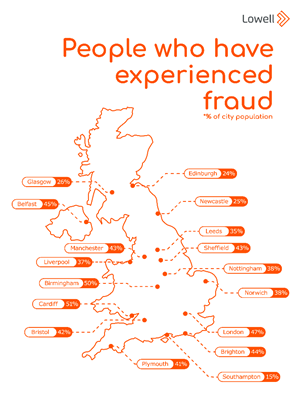Fraud UK: Nearly one-fifth of Brits have experienced credit or debit card fraud

With an increase of fraudulent activity being reported across the UK during the pandemic, the importance of knowing how to spot and prevent fraudulent activity has become increasingly important. Debt management company Lowell have conducted research into fraud across the UK and the results have shown just how fraud has affected millions of people.
Despite nearly three quarters of Brits (74%) believing that they would not give out any details to someone claiming to be from their bank, nearly one fifth (18%) of Brits have still experienced credit or debit card fraud.
The research also found that 15% of Brits would be likely to click through a text link if they were contacted by someone claiming to be their bank, and 15% of Brits claimed they would not do any checks to guarantee a call from their bank was legitimate.
The most common types of fraudulent activity across the UK
Fraudulent activity is taking place throughout the UK and the ways in which Brits are being targeted is constantly changing. Fraud committed using a debit or credit card has impacted the most people, with nearly one fifth (18%) of Brits having had an experience with it.
Other common types of fraud that affect nearly one in ten Brits include internet banking fraud (9%) and text fraud (8%). In addition to this, one in twenty Brits have experienced mobile banking fraud (6%) and cash machine fraud (5%).
The statistics show that the most common age group targeted by fraudulent activity are 16–24-year-olds, with 62% of young people saying they have experienced some form of fraud.
UK Fraud hot spots
Research reveals that Cardiff is the most common place to experience fraud in the UK, with 51% of people reporting that they have had an experience with fraud, closely followed by Birmingham at 50%.
In contrast, only 15% of people from Southampton reported they had experienced fraud making it the best city in the UK to avoid fraudulent scams.




